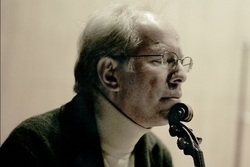
The Latvian-born violinist Gidon Kremer brings his trio to the Royal Conservatory’s Koerner Hall on Friday for a Toronto program of chamber music by modern Russian composers and J.S. Bach. (He also appears with the Montreal Symphony Orchestra on Oct. 18 and 19.)
The prodigious musician grew up in the Soviet Union, and studied with the renowned David Oistrakh in Moscow. Following victories at Western music competitions and international tours, he left the Soviet Union in 1980. No stranger to controversy, he’s been in the news recently for his public stances on political and artistic issues.
A: I am a Latvian – but at the same time, I’m a child of the former Soviet Union. I’m very close to Russian culture, and I have plenty of friends in Russia.
My choice of composers for this concert underlines my connections to Russia. Sofia Gubaidulina and Valentin Silvestrov both were opposed to the totalitarian ideology that was imposed upon them during the 1960s and 70s. They were not representatives of the official school. And of course Shostakovich was a major Russian composer in the 20th century.
Q: You’ve spoken out in support of two “political prisoners” in Russia: Mikhail Khodorkovsky and Platon Lebedev, who were convicted of fraud and tax evasion. Why did you do this?
A: I’m not involved in politics, but with some of my colleagues I wanted to make a statement opposing the rulings in the courts against these businessmen. These cases have become a symbol of tendencies in Russian society very closely associated with the former Soviet Union.
Q: It seems that whenever a musician takes a political stance, someone somewhere says, “Music and politics shouldn’t be mixed together.” What do you think?
A: We can say more with music than politicians can by juggling words and slogans. Music is more powerful, and it’s important for musicians to speak out, even if we aren’t politicians. I’m not trying to be more than I am, or engage in public relations for myself. I’m trying to be an honest human being.
Q: You’ve also been recently involved in an artistic controversy: You withdrew from the prestigious Verbier Festival in Switzerland this summer. Why did you do this?
A: We live in a world where a commercial approach to art is very powerful. I oppose the idea of a festival that has so many so-called stars – some of them genuinely gifted, others artificially raised. I don’t wish to say only negative things about Verbier: There are many good things there. But at the same time, stardom is accentuated, and this is a value I do not share.
Q: If you’re not interested in performing at a place like Verbier, then what concert venues do inspire you to perform these days?
A: As an artist, I’m obliged to play on many stages: Some of them I like more, some of them I like less. I’m not trying to be a snob. The point is to establish a communication with the audience. Any audience that is really willing to listen is welcome to me – and I hope I have something to say to them.
Q: What country do you consider to be your home today?
A: Most of the time I travel, so mainly I’m between airports and hotels. I have a quiet spot in Vilnius, in Lithuania, and another place in Switzerland. But I would say that my real home is the stage. Of course, I was born in Latvia, and it always will remain my homeland.
© Copyright Colin Eatock
 RSS Feed
RSS Feed

